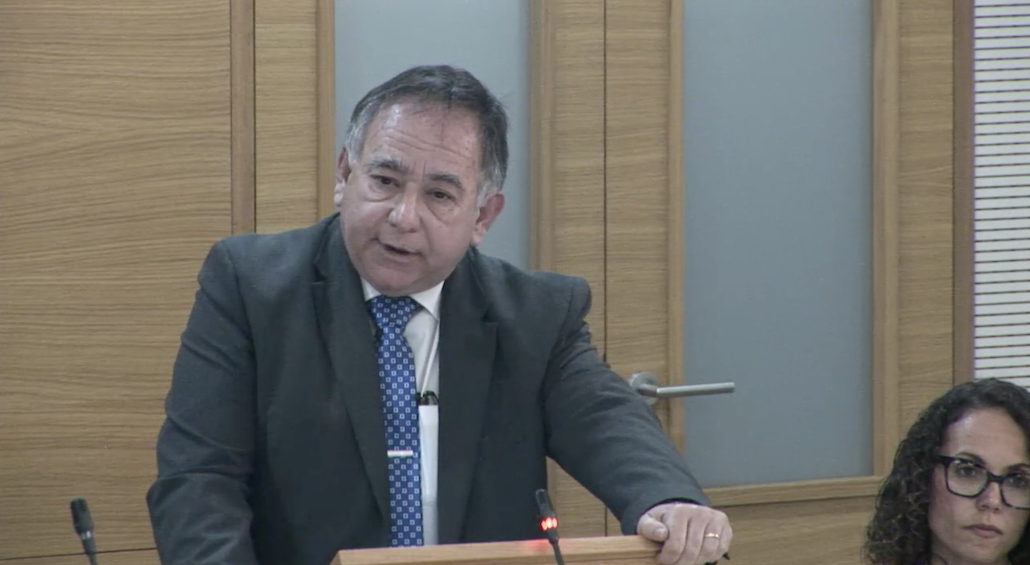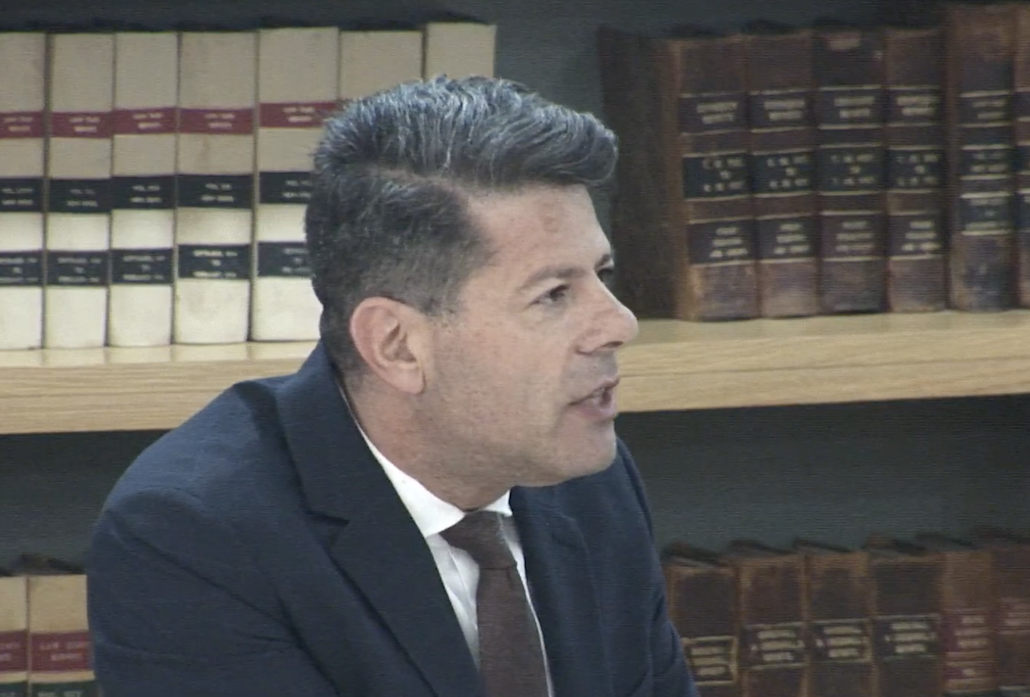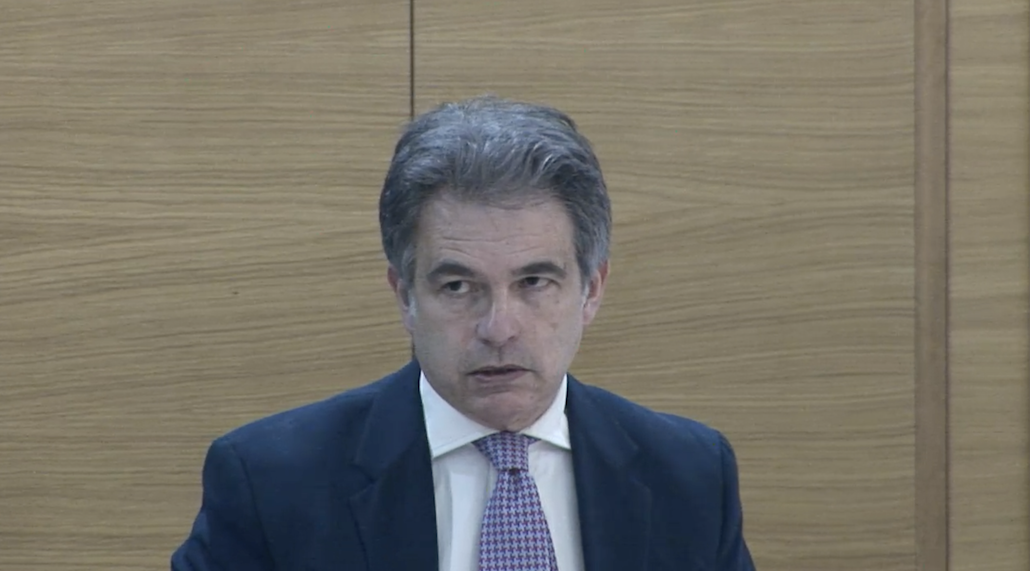Govt and Opposition ‘poles apart’ as MPs debate audit report
Archive Photo by Johnny Bugeja.
If one clear thing emerged from a debate in Parliament on Monday on the Principal Auditor’s report and calls for a Public Accounts Committee, it was this: In the words of Dr Joseph Garcia, the Deputy Chief Minister, the two sides of the chamber were “poles apart”.
The debate was prompted by a motion tabled by GSD MP Roy Clinton calling on the Government to bring to Parliament any outstanding supplementary appropriation Bills, and to establish a Public Accounts Committee to ensure “proper financial scrutiny and oversight” of public finances.
At the heart of the motion was GSD criticism that “deliberately engineered” delays in bringing these Bills to parliament had in turn slowed the work of the Principal Auditor and hindered the Opposition’s ability to hold ministers to account.
Mr Clinton’s motion also renewed his longstanding call, first made in 2016, for a Public Accounts Committee to be established to allow for in-depth scrutiny of public spending, including by questioning heads of department, to supplement the Principal Auditor’s work and strengthen accountability.
By the end of the session though, after a debate that commenced at 3pm and ran late into the night, the motion had been amended entirely.
In its place, Chief Minister Fabian Picardo tabled an alternative text that welcomed the Principal Auditor’s report and supported his work, commending the government's support to that end; signalled that the government would bring two outstanding supplementary appropriation Bills to Parliament in March; noted that the government’s position not to establish a Public Accounts Committee was a manifesto commitment; noted that contracts to Meddoc and other healthcare providers were the subject of tenders and negotiations; and called on the Principal Auditor to conduct an investigation into the legality of the grant of contracts by the GSD to Master Services and for the airport tunnel roads and related works.
The government’s view was that it was tackling abuse and waste that in large part had its roots in decisions taken during the GSD’s time in office, and that many of the criticisms in the audit report highlighted by the GSD had valid, nuanced responses.
It said a Public Accounts Committee was not necessary because it was ministers who should be held accountable for public spending.
As for the delays with the Bills, the Government reminded the GSD that since 2016, Gibraltar had faced crises not of its making that had disrupted the normal work of government.
Over the course of over eight hours, each side accused the other of "misinformation" and "distorting reality" for political gain.
The motion was finally voted on at 11.20pm and was passed as amended by the Chief Minister thanks to the government’s in-built majority, with the GSD voting against.
‘DELIBERATELY ENGINEERED’

In presenting the motion, Mr Clinton said the delays to the appropriation Bills had been “deliberately engineered” by the Government to avoid “proper financial scrutiny and oversight of public finances”.
“We have something broken. Something's not working. Something is seriously wrong,” Mr Clinton said.
“And it prevents the Opposition from being able to hold the Government to account.”
“We cannot do it without reports. [The Chief Minister] expects us to tell him where to identify waste [but] we do not have access to the books of the government.”
“We cannot go in and audit them. I would love to. I would do it for free.”
“But I do not have that ability, so we rely on the Principal Auditor.”
“[But] we do not have any reports, so go figure.”
On the call for a Public Accounts Committee, Mr Clinton reminded Parliament that Gibraltar had once had such a committee and, while disbanded after a year, it had worked well in a non-partisan manner to protect the public purse.
He said experience had shown that the Government did not respond in any detail to probing questions in Parliament on public finances, and that the Opposition did not have the same audit powers as the Principal Auditor.
Mr Clinton said voters were “in a state of shock and anger” at the contents of the Principal Auditor’s report and expected action from Parliament, adding Gibraltar is the only Overseas Territory with a Public Accounts Committee.
“This is the direction of travel around the world, one which the GSLP/Liberals simply do not accept,” Mr Clinton said.
‘NOBODY ELSE’
First to reply for the government was Sir Joe Bossano, who reminded Mr Clinton that the Government’s position on this issue had been set out as a manifesto commitment at the last general election, on which the GSLP/Liberals had been elected to office.
“It is not that there has been a Public Accounts Committee since 1972 and we came and stopped it,” Sir Joe said.
“Nobody else had tried to have a Public Accounts Committee.”
“So, we have a situation where nothing that is being done now has not been done before in the last 53 years that I've been here, except for one year when it was done for a specific reason to look at the particularly controversial purchases that had been made,” Sir Joe said.
“So, if not having a Public Accounts Committee is such a terrible crime against freedom and liberty and democracy, then every government in Gibraltar since 1972 has been guilty.”
But GSD MP Damon Bossino said Mr Clinton’s arguments in presenting the motion were “unassailable”, as he urged ministers to be open to changing their view on the issue of the Public Accounts Committee.
“They are not reflecting the public mood about this,” Mr Bossino said, reminding Parliament of how close the last general election had been.
“The fact that it has happened for so long doesn't mean it is right,” Mr Bossino said.
“We need to move on…[because] this is an important proposition.”
And on the Principal Auditor’s report, Mr Bossino added: “Goodness knows what would have happened had this report been published before the 12th October 2023.”
“We will never know what the electoral results would have been, but I suspect that the verdict would have been certainly in our favour.”
“Because I cannot think of a Principal Auditor's report which has attracted, quite frankly, and I put it as high as this, so much opprobrium.”
‘DISTORTED’
Addressing Parliament, Deputy Chief Minister Dr Joseph Garcia referred to previous audit reports to underscore his argument that these too had highlighted similar issues and made similar recommendations in the past.
Dr Garcia said the difference now was that the latest report had been “politicised”, “distorted” and “taken out of context” by the GSD, particularly in respect of value for money audits.
“It is wrong to present a series of individual, separate and unrelated cases as evidence of a systemic failure of the entire administrative system of the government,” Dr Garcia said of the Opposition’s criticism.
“That approach undermines public confidence in public officials and it also ignores how government after government, year after year, term after term have contributed to the wider picture that has been presented now.”
And he added: “And, surely, they are not saying that those agreements should now be reached, that allowances should be revoked, that all kinds of overtime should be cut…that people should lose their jobs. Because that is a logical conclusion of the approach that they have taken.”
He urged the Opposition to exercise “a degree of political maturity and responsibility”, adding that while it was “perfectly legitimate” to probe and pursue different policies, “it is not legitimate to distort, to mislead and to manipulate in order to serve their own basic political ends”.
On the Public Accounts Committee, Dr Garcia said the GSD had once supported the creation of such a committee while in Opposition but had not established one when in government.
“They are perfectly happy to commit to this policy in Opposition, as they have done, but not to pursue the matter once in government,” Dr Garcia said.
Dr Garcia said too that the GSLP/Liberal administrations published more financial information, both during the Budget and in regular updates to Parliament and on its website, than ever before.
“The policy that they subscribe to would allow ministers to hide behind civil servants when in our view, it is precisely ministers, any ministers, who should sit here and face the music,” he added.
‘LYNCH MOB’

The Chief Minister accused the GSD of “running a lynch mob” against the Government and said many of the issues identified by the Principal Auditor, for example the early exit schemes, had their roots in the time that the GSD was in office.
“The Principal Auditor is identifying the problem today of the thing that they did 12 years ago,” Mr Picardo said.
The Chief Minister dismissed the GSD’s criticism that he was “scared” to be held accountable for public spending under his administration.
That logic was “completely flawed”, Mr Picardo said.
“I am telling them we will not have a Public Accounts Committee because I am here to face the music.”
“I am the opposite of being scared.”
He dismissed too any suggestion that he had “deliberately engineered” delays to the Principal Auditor’s report, adding the information in the supplementary appropriation Bills was already in the Budget estimates’ book.
Moreover, the Principal Auditor’s report had been sent to Parliament a day after the Chief Minister had received it.
“I say to the Honourable Members that they are absolutely wrong to even raise that we would seek to delay a Principal Auditor's report, and I cry shame on them for suggesting the opposite,” Mr Picardo said.
He reminded MPs too that the years under review in the Principal Auditor’s report were the years when the Gibraltar Government was dealing with the immediate aftermath of the Brexit vote in June 2016.
“Or is it that 2016, in their minds, was not an equally traumatic year for Gibraltar, although nothing can compare to the lives lost with Covid?” he said.
“But in terms of political work, and political travel and personal sacrifice, the Honourable Gentleman can believe me, if he's ever going to believe me, that 2016 and 17 and 18 were some of the toughest years we have ever had in government, although we've hardly had any easy time of it since then.”
Mr Picardo rejected the GSD’s argument that Covid could not be used to justify delays and disruption across much of government business, including the tabling of Bills in Parliament.
“If he doesn't want to accept it, so be it,” Mr Picardo said.
“I can tell him, having lived through government in Covid, that Covid wasn't just something that happened in six months in 2020.”
“Or is the Honourable Gentleman forgetting the further restrictions at the end of 2020, the further restrictions at the end of 2021, all of the different aspects of the pandemic. Really.”
On the Public Accounts Committee, Mr Picardo said Mr Clinton wanted “five minutes of fame”.
“He wants to be in the Public Accounts Committee to do to civil servants in Gibraltar what members of Parliament in the United Kingdom try to do to me when they quiz me on Gibraltar,” Mr Picardo said.
And he added: “What they want to do is to embarrass civil servants.”
Mr Picardo insisted that much of what the Principal Auditor had identified had roots in past GSD administrations but that the GSD glossed over this.
“And what a better analysis does is demonstrate that the GSD early exit packages were bad for Gibraltar and in particular for its public finances, that they were not valued for money, that overtime had got out of control in their time and that we stopped the abuse,” Mr Picardo said.
He accused the GSD too of taking the opposite side whenever the government tried to address issues of overtime and allowances, which on occasion had led to protests supported by GSD MPs.
“One day they are crusaders against overtime, and the next day they are crusading to my office to defend overtime because we've had the gumption to try and stop it,” Mr Picardo said.
Mr Picardo said that if the election was narrow, it was because the government was “standing in the way of the abusers”.
“If we lost support, it's because we were stopping the things that the Principal Auditor has identified are the problem,” he added.
“We have been firm on these issues, and if it's cost us popularity, it's cost us popularity because it was the right thing to do.”
“That's why we agree with the Principal Auditor in many of these things, because he was agreeing with us.”
‘TRUMPIAN’

For Keith Azopardi, the Leader of the Opposition, Mr Picardo’s arguments amounted to “Trumpian” and “Orwellian” spin.
He said much of the Chief Minister’s amendment of Mr Clinton’s motion “flies in the face” of the Principal Auditor’s findings.
Throughout his contribution, Mr Azopardi said the Chief Minister was “the master of misinformation” with a “scatter gun approach”, especially when he claimed the GSD had “sown the seeds of abuse”.
Referring to the early exit schemes by way of example, Mr Azopardi said that while the first one had been introduced by the GSD, the GSLP/Liberals had continued and expanded it and rolled out similar schemes in other departments.
“No one believes that after 12 years of government, when someone reports on your term in office, it's somebody else's fault,” Mr Azopardi said.
“Nobody believes that.”
Mr Azopardi echoed Mr Clinton’s argument that the delays with the supplementary appropriation Bills were “politically engineered” and slowed the work of the Principal Auditor.
He said the situation amounted to a “democratic deficit” and that the GSLP/Liberals were the political beneficiaries of a lack of scrutiny.
“When the Principal Auditor’s work is blocked to the point that he cannot conclude his reports, of course, it's a democratic deficit,” Mr Azopardi said.
“It's a double democratic deficit when there isn't a Public Accounts Committee to support the work.”
On the question of the Public Accounts Committee, Mr Azopardi said the GSD had tried to set one up but had not had the support of the then GSLP/Liberal opposition.
He said the fact Gibraltar was the only Overseas Territory not to have a Public Accounts Committee was “strange”.
“It makes Gibraltar seem a strange, unique place where somehow it must be shielded from the light of accountability that has shone throughout the Overseas Territories and Crown Dependencies that have introduced these systems,” Mr Azopardi said.
“In reality, what is happening here is not that the Honourable members want to protect civil servants, but that they are saying that to hide behind civil servants so as to protect themselves from accountability. That's the reality.”
And he added: “I think what is important is to recognise is that there is a need to modernise.”
“We can't just stay where we were because we've done it in that way for the last 20 or 30 years or 40 years, whatever it is, just to stay in this parliamentary straight jacket, despite the fact that governance reforms require something different.”









